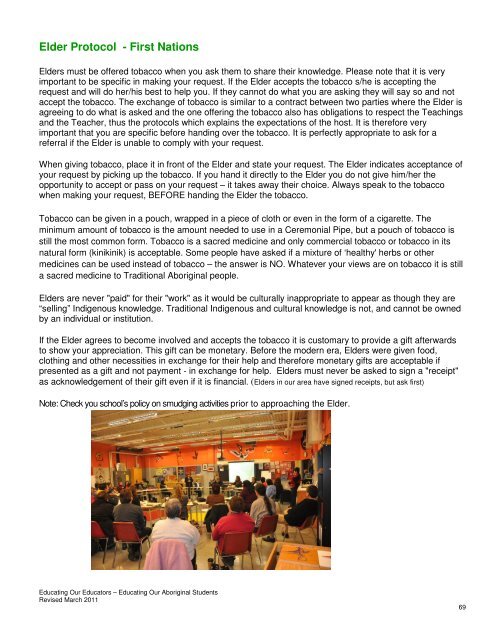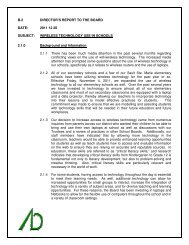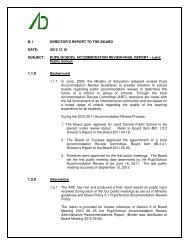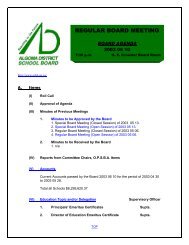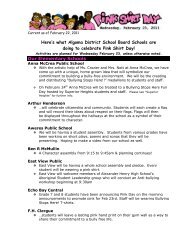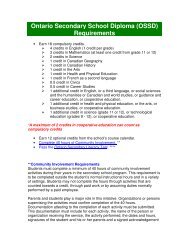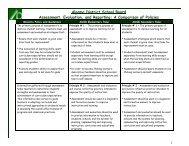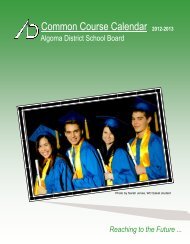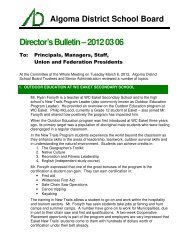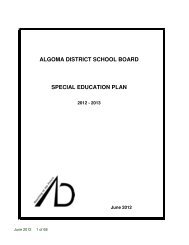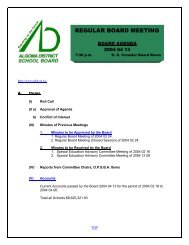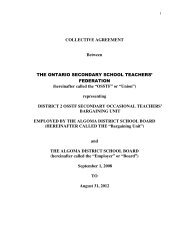Educating Our Educators (March 2011) - Algoma District School Board
Educating Our Educators (March 2011) - Algoma District School Board
Educating Our Educators (March 2011) - Algoma District School Board
- No tags were found...
You also want an ePaper? Increase the reach of your titles
YUMPU automatically turns print PDFs into web optimized ePapers that Google loves.
Elder Protocol - First NationsElders must be offered tobacco when you ask them to share their knowledge. Please note that it is veryimportant to be specific in making your request. If the Elder accepts the tobacco s/he is accepting therequest and will do her/his best to help you. If they cannot do what you are asking they will say so and notaccept the tobacco. The exchange of tobacco is similar to a contract between two parties where the Elder isagreeing to do what is asked and the one offering the tobacco also has obligations to respect the Teachingsand the Teacher, thus the protocols which explains the expectations of the host. It is therefore veryimportant that you are specific before handing over the tobacco. It is perfectly appropriate to ask for areferral if the Elder is unable to comply with your request.When giving tobacco, place it in front of the Elder and state your request. The Elder indicates acceptance ofyour request by picking up the tobacco. If you hand it directly to the Elder you do not give him/her theopportunity to accept or pass on your request – it takes away their choice. Always speak to the tobaccowhen making your request, BEFORE handing the Elder the tobacco.Tobacco can be given in a pouch, wrapped in a piece of cloth or even in the form of a cigarette. Theminimum amount of tobacco is the amount needed to use in a Ceremonial Pipe, but a pouch of tobacco isstill the most common form. Tobacco is a sacred medicine and only commercial tobacco or tobacco in itsnatural form (kinikinik) is acceptable. Some people have asked if a mixture of ‘healthy' herbs or othermedicines can be used instead of tobacco – the answer is NO. Whatever your views are on tobacco it is stilla sacred medicine to Traditional Aboriginal people.Elders are never "paid" for their "work" as it would be culturally inappropriate to appear as though they are“selling” Indigenous knowledge. Traditional Indigenous and cultural knowledge is not, and cannot be ownedby an individual or institution.If the Elder agrees to become involved and accepts the tobacco it is customary to provide a gift afterwardsto show your appreciation. This gift can be monetary. Before the modern era, Elders were given food,clothing and other necessities in exchange for their help and therefore monetary gifts are acceptable ifpresented as a gift and not payment - in exchange for help. Elders must never be asked to sign a "receipt"as acknowledgement of their gift even if it is financial. (Elders in our area have signed receipts, but ask first)Note: Check you school’s policy on smudging activities prior to approaching the Elder.<strong>Educating</strong> <strong>Our</strong> <strong>Educators</strong> – <strong>Educating</strong> <strong>Our</strong> Aboriginal StudentsRevised <strong>March</strong> <strong>2011</strong>69


